Don't wanna be here? Send us removal request.
Text
Chapter 60: In which Wukong thinks he's a lot more of a stud than he is

Alright. Let's get this barf-fest of a chapter over with.
It starts out fine. The mysterious local spirit from last chapter tells Wukong that the Mountain of Fire is, in fact, Wukong's fault.

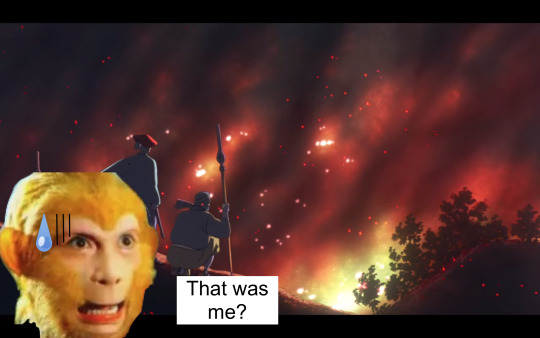
He also tells him that the only way to get the palm-leaf fan is through Bull Demon King (BDK).
This begins an entire chapter of misogynistic fan service. There's misogyny by Wukong to Princess Jade Countenance (PJC); from BDK to PJC; from Wukong to Princess Iron Fan; and from BDK to Princess Iron Fan.
Very little happens along the way. The chapter is almost entirely an excuse to have scene after scene of gratuitous misogyny.
If you cut out some of the more egregious stuff, the plot boils down to this:
PJC, a wealthy heiress, has taken in BDK as a toy boy. (There's a thin pretext that she paired up with him because his magical powers could help protect her estate, but frankly with her wealth I imagine she could hire any number of mages - like those parents who hired a string of mages to try to rescue their daughter from Bajie. So I suspect she just says that to soothe his ego, so he doesn't just feel like a pretty face.) He's still married in theory, but he hasn't looked back since moving in with PJC and has consistently been paying alimony to Iron Fan.
Wukong runs into PJC on the mountainside. Wukong decides to physically attack her. PJC, being quick on the uptake and a survivor, decides this would be a good time to GTFO.

Wukong chases her as she runs back home. Hence he finds Cloud-Touching Cave, where BDK is.
BDK comes out, and he squares off with Wukong. BDK agrees to give him the fan if Wukong can best him three times in a fight, but gets called away to a banquet after just one round. He jumps on a water-repellent golden-eyed beast and heads to the banquet.
Yes, water-repellent.

Wukong stalks him to another mountain, where he loses track of him near Green Wave Lagoon. He transforms into a crab and sinks to the bottom.


Lo and behold, there is the water-repellent golden-eyed beast - and the banquet.

It's a beautiful sight:

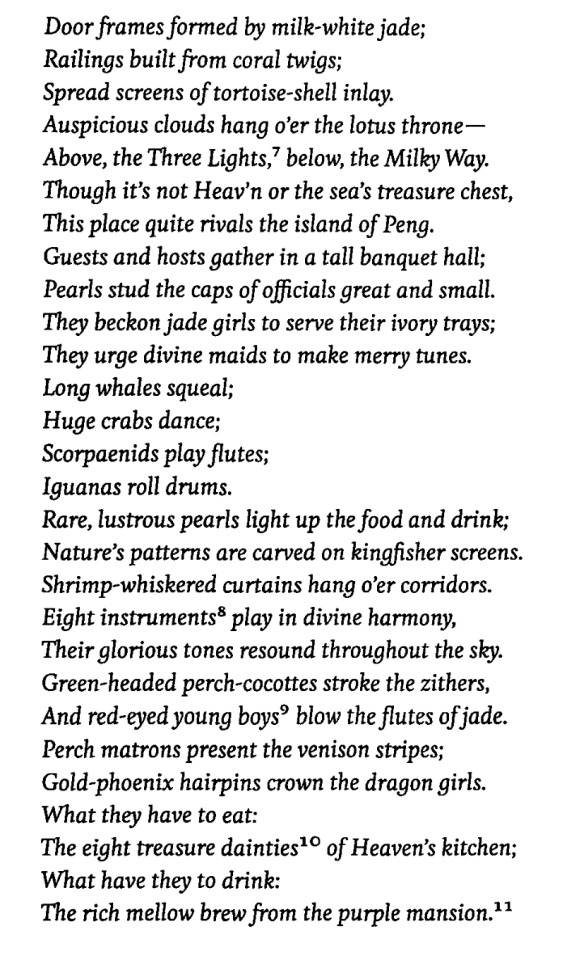

Interestingly, footnote 9 explains that 'young boys' is 'malang',

which has multiple layers of significance here. One is that 'malang':

I couldn't find Yu's version of the story, but I found a video version and transcript.
Anyway. Generations of dragon spirits are hosting BDK as the guest of honour.
Wukong quickly proves that he is no James Bond. There is nothing clever about his attempt to infiltrate the banquet. He just walks right in, albeit in crab form.
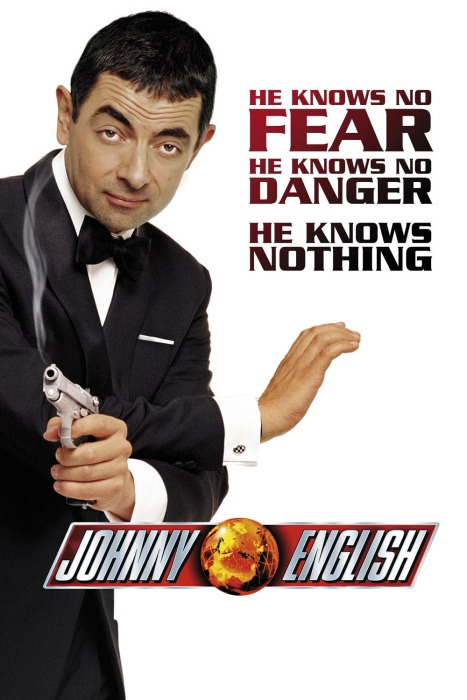
He's seized immediately and threatened with death, but he pleads that he's just an ignorant bumpkin crab who didn't mean to cause any trouble. They decide to spare him and just kick him out.
Wukong figures that if he steals the water-repellent golden-eyed beast, it will help him to pass himself off as BDK, and he can trick Princess Iron Fan into handing over the fan.

He turns up at Iron Fan's place, riding the beast, and greets her disguised as BDK. Apart from the disguise, Wukong is, once again, incredibly bad at espionage. He just straight up asks her:

Subtle.

Iron Fan spits the tiny fan out of her mouth, where she's been hiding it, and gives it to him.

Wukong stares at the fan really blatantly: so much so that Iron Fan asks him what's up. It's like he isn't even trying to maintain cover at this point, because he straight up asks how such a small fan is meant to extinguish 800 miles of flames.
Iron Fan calls him out on how bizarre this question is, but answers anyway:

With this, Wukong reveals his true identity, just to spite her.

He runs off with the fan, which he enlarges to 12 feet, and then can't shrink again.
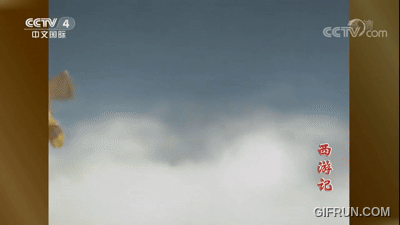
The real BDK arrives at Princess Iron Fan's place, but too late. He borrows Princess Iron Fan's swords and goes after Wukong.
And that's it for this chapter!
So why did I say Wukong thinks he's more of a stud than he is? Well, I cut that out along with most of the misogyny. Half the misogyny involved scenes where rich, attractive, powerful women threw themselves at men in highly implausible circumstances. I'm not even going to get into the other half. If you've read chapter 60 for yourself, all I can say is, yeah right, boys. In your dreams.
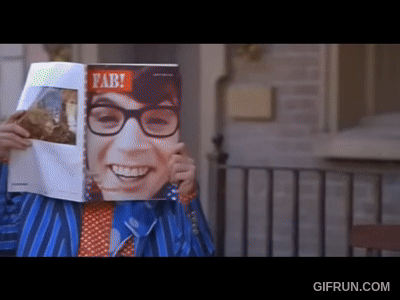

@journeythroughjourneytothewest
---
Image credits: The usual spiel. The images above are random pictures/videos from the web, some modified, some not. They are not original. Many of these are from the 1986 version of Journey to the West. The pre-existing images should turn up with reverse googling or have links embedded, but feel free to ask and I’ll dig up sources.
8 notes
·
View notes
Text
To read or not to read?
Alright. Well, here I am again.
I stopped writing at chapter 60 because of the level of misogyny in JTTW. Don't get me wrong - I wasn't expecting a work of literature this old to be a shining example of respect and equality. But the level of misogyny I've seen in the book so far has been well beyond what I expected, and smuttier. Women seem to feature mostly as borderline porno plot points.
I'm still not sure that I want to subject my brain to a weekly drip-feed of this level of sexism. Also, I'm not exposed to many other sources of Chinese culture on a regular basis, and I really don't want something this chauvinistic to be my main impression of Chinese culture week after week.
Nor do I want to lose time being reactive and calling out the chauvinism week after week. Sure, there can be a point to dissecting stuff and calling it out. But I don't want to it to chew up too much of my time or energy. Besides, if all I wanted to do is to spend my life reacting to pigs, I'd hardly need to read JTTW.
So why am I back? Well, the universe seemed to be calling me back to it. And by 'universe', I mean 'social media'. Ie I saw this and this.
In all seriousness, though, I guess JTTW just kept tickling at the back of my mind. My original reasons for wanting to read it still stand. I want to learn more about Chinese culture, and JTTW is so ubiquitous. And, at the risk of stating the obvious, JTTW is awesome. I connect with it in a way that I just haven't with Romance of the Three Kingdoms (I'm not big into battles or politics) or The Water Margin (which I can see myself loving; it's just not JTTW).
I figure I'll take it chapter by chapter and see if I can engage with it without doing collateral damage to my brain. I doubt it, but let's see.
Failing that, I'll sit back and see what John Zhu does with it. I'm hoping he'll provide a bit of a buffer against the more misogynistic aspects of the book while still providing a fairly traditional account of it.
Alright. I'd better get reading and writing.
5 notes
·
View notes
Text
Chapter 60: Misogyny triumphs; something something Flaming Mountain
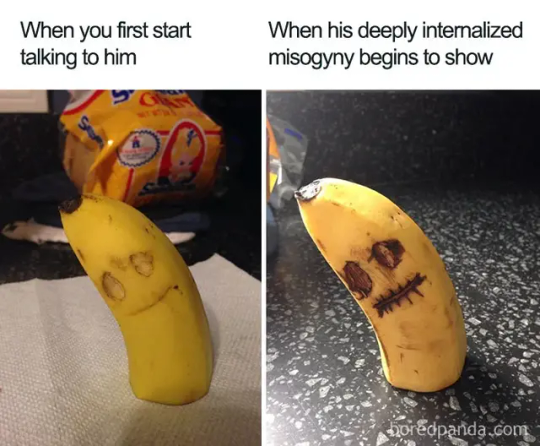
Well, this chapter was pretty much a misogynist’s fantasy.
I’m not going to spell it out. I trust that everyone here has the capacity to see it for themselves if they want to. So let me express my feelings about this chapter thus:




If you need some brain bleach after that chapter, may I recommend one of Jung Chang’s books, or maybe watching a documentary about Nushu, the secret written language created by Chinese women for women only.
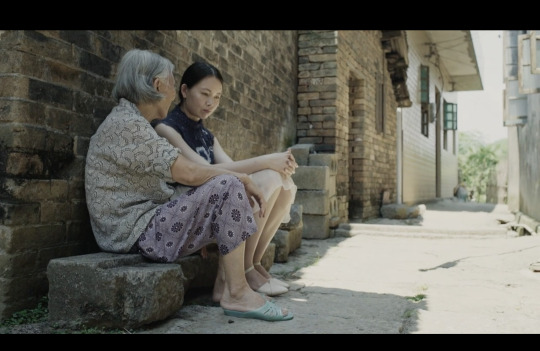
Baaaaai! See you next week!
@journeythroughjourneytothewest
—
Image credits: The usual spiel. The images above are either AI, or random pictures from the web, or a Frankenstein of both; some modified, some not. They are not original. The pre-existing images should turn up with reverse googling or have links embedded, but feel free to ask and I’ll dig up sources.
#jtjttw submission#jttw reading group#jttw book club#jttw feminism#asianfeminism#asian feminism#chinese feminism
6 notes
·
View notes
Text
Ch 59: Yum cha, fire and literal bubble tea

This chapter was just all-round beautiful. Atmospheric, poetic, visually vivid and full of music - although sometimes also uncomfortably realistic (unnaturally hot weather; mountain fires).
The red mountain made me think of landscapes I’ve seen. The idea of drums and bugles saving people from the sound of the sizzling sun sinking into the sea made me think of the din of musical instruments at Chinese New Year. The dragons in the streams and the paulownia trees were simply beautiful.
And the music! There is so much music. Yu’s footnotes say that three of the poems are set to pre-existing Chinese tunes. I tried to dig them up. They’re at the bottom of this post, for anyone interested.
Well, let’s begin. As we know, the travellers come upon a strangely sweltering part of the landscape. Bajie thinks they must be at the Edge of Heaven, but Wukong points out they can’t possibly have travelled that far. They approach the house of a local man, introduced to us through the ‘Not Quite’ poem.
I loved this poem. It reminded me a little of the Phantom Tollbooth or of Lewis Carroll. (Of course, that may well be because I don’t know much, if any, non-western poetry or literature with which to compare it. Do let me know if you know any Tollbooth-esque literature or poetry from other cultures.)
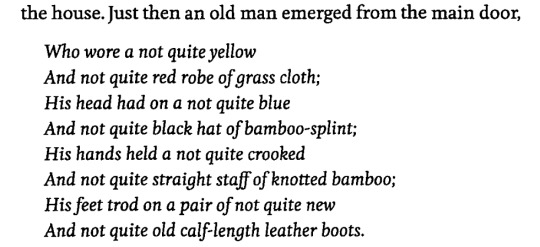
He tells them they’re at the foot of the Mountain of Flames.
I didn’t realise the flaming mountains were a real land feature in China - minus the pyrotechnics. Apparently travellers along the Silk Road avoided them. The soil temperature has been estimated at 66.8°C (152.2°F). (Thanks Wikipedia.)

Tripitaka is overwhelmed at the mere thought of the heat. He turns pale and falls silent - right back to his old ways:

Wukong, being the ADHD kid that he is, gets distracted by a vendor with a cart, and goes to buy rice pudding with a hair-turned-copper-coin.
I don’t know which kind of rice pudding this means, but it sounds delicious. Maybe this?

Or this?

But really I’m just thinking of this - which has nothing to do with rice or pudding, but everything to do with me getting excited when a Chinese food cart rolls around:

Wukong calls bullshit on the place being hot all year round. He figures if they can make rice flour for rice pudding, there have to be both hot and cool seasons.
And so they find out about Immortal/Princess Iron Fan, whose fan can extinguish the fires and even bring rain.
Cut to the woodcutter on Jade Cloud Mountain, who has a real chip on his shoulder about calling her ‘immortal’:

The 'Raksasi' thing may or may not be a jerk move, because apparently it just means ‘female demon’:

Wukong gets nervous about having to confront another angry relative of Red Boy, and the woodcutter schools him on how he should never be nervous as a Buddhist:

Even when Wukong explains his bind, the woodcutter stands by it:

I somehow love the total lack of strategy here. “Okay. You have every reason to think that this demon will refuse to give you what you want. Just disregard that entirely, and go in there confidently.”
Wukong finds Iron Fan, gets his ass kicked by her, and takes back some of the condescending thoughts he’d had about her as a woman fighter. We go from this:
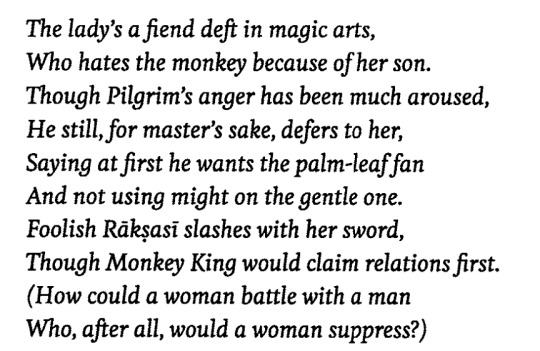
To this:

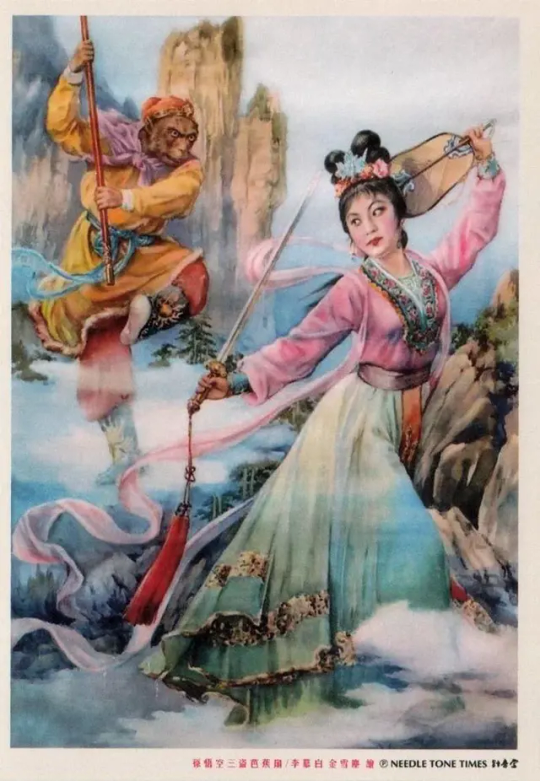
He’s bailed out by Bodhisattva Lingji, who conveniently has a Wind-Arresting Elixir. Wukong returns to unwarranted pride in his manhood in no time:

I mean, the only reason he can withstand the wind is that a woman was nice and gave him an elixir. So I'm not sure what it has to do with him being a man.
He sneaks into Iron Fan’s stomach via her tea:


In the ultimate Trojan Horse move, he prods her insides til it hurts. I must not have been the only one thinking of yum cha when the rice pudding came up, because the dim sum theme continues:
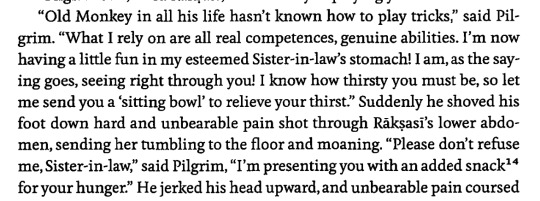


Iron-Fan puts on a good pretence of panicking and surrendering, but keeps her cool. She gives Wukong a fake iron fan. He doesn’t realise until he’s dragged the whole of Team Tripitaka up the Mountain of Flames and made the fire worse.
Tripitaka cries.

Ah, dear Tripitaka. He wants those scriptures. He wants them SO MUCH. And if he can’t get them, his heart is going to break.
Meanwhile, Bajie is just laughing his ass off because Wukong lost all the hair from his thighs in the fire.
The guys are at a bit of a loss. The only way to the west is to pass the Mountain of Fire, but nobody really knows what to do next. Clearly Wukong is no longer feeling so confident about kicking Iron Fan’s ass, cos he’s not even talking about trying a third time.
While they’re kicking around, they’re approached by a mysterious man, who turns out to be the spirit of the Mountain of Flames. He tips them off about what to do next.
And that’s it for this week. I’m excited for the next chapter, because I came across some ceramic art online that gave me some possible hints about next week. I’ll refrain from posting it, but we’ll see next week.

Music
As promised! The music for the three poems.
#1 To the tune of the Wind in the Pines
《風入松歌》 Feng Ru Song Ge


Music: https://www.youtube.com/watch?v=KOr1-ZeVGvM
About the music: https://silkqin.com/02qnpu/10tgyy/tg28frsg.htm
#2 To the tune of Barbarian Bodhisattvas


Probably this music? https://www.youtube.com/watch?v=d1jmF5zg9yI
#3 To the tune of Moon Over West River
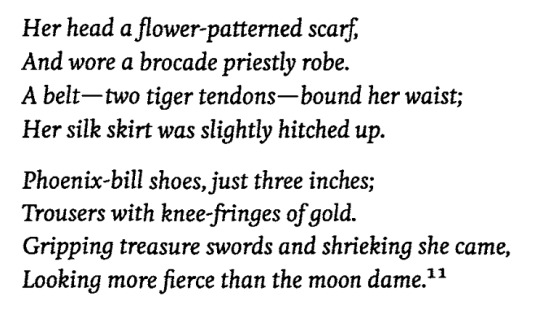

Music: https://www.youtube.com/watch?v=hGMkxd8RW5o
@journeythroughjourneytothewest
—
Image credits: The usual spiel. The images above are either AI, or random pictures from the web, or a Frankenstein of both; some modified, some not. They are not original. The pre-existing images should turn up with reverse googling or have links embedded, but feel free to ask and I’ll dig up sources.
#journey to the west#jttw#jtjttw submission#jttw reading group#jttw book club#tang sanzang#tripitaka#guanyin#sun wukong
10 notes
·
View notes
Text
Chapter 58: Wukong chooses good over evil. By killing somebody.
Well, this chapter explained a lot. I’m finally up to speed with you all - the Six-Eared Macaque was Wukong’s alter ego. Now that I know, I’m seeing the last few chapters differently. So I want to circle back to this from last chapter:
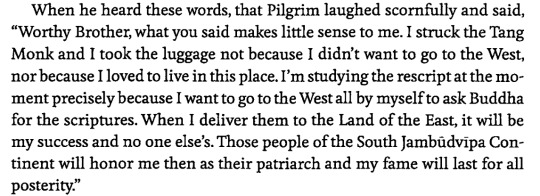
Look, we’ve all had bad experiences with team work. I’m sure we’ve all had times when we’ve wanted to spit the dummy and just do the whole thing ourselves. So we can take all the credit, which we totally deserve… maybe. But apparently that is not the solution.
It is interesting that the macaque is killed, not just subdued. Not only is it killed, the entire species is permanently eradicated:

That is, Wukong’s decision to commit to ‘good’ is permanent; even irreversible. That is a deep level of commitment. It’s very different from the idea of having to fight temptation constantly - having to re-commit to choosing good every day, many times each day.
In other words, I was thinking this:

Whereas Wukong was thinking this:

I guess he’s got a point. If you’re ever going to reach true enlightenment, I guess you’ve got to quit your earthly bullshit once and for all.
So I guess it’s kind of like this:

And then you’re Gryffindor forever, no further effort required to stay away from the dark side. HOORAY! Except I think Wukong would be more like:

Interestingly, Tathagata’s description of the Six-Eared Macaque doesn’t make him sound inherently evil:

The footnote is cool:

Brave’s AI had a wildly different take on that saying:
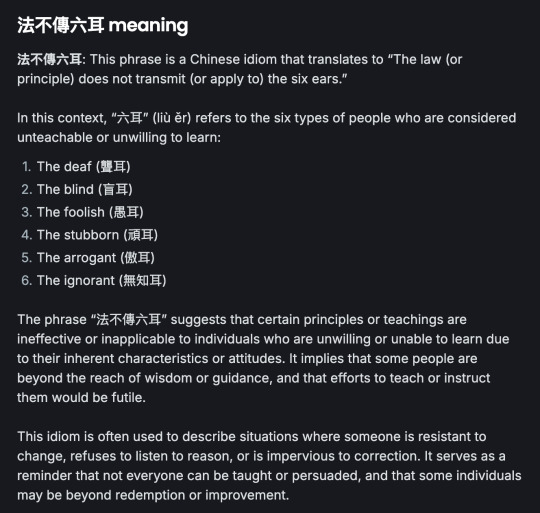
I mean, Yu would know better than random AI, obviously. But the AI answer did make me curious. Alas, the search results seemed to have nothing to do with it.
Anyway, Wukong’s lack of sentimentality in killing the macaque is interesting. So is his reproach to Tathagata when Tathagata seems horrified:

Perhaps Wukong is right: perhaps bad traits within oneself should be squelched unflinchingly, without a backward glance. Perhaps compassion is an inappropriate reaction there, just as Tripitaka’s “compassion” is misplaced a lot of the time.
Still, I’m surprised that nobody punishes him or says he’s out of line for telling Tathagata of all beings what to do. Seems pretty cheeky.
The conflict between Wukong and Tripitaka is resolved by Tathagata and Guanyin telling Wukong and Tripitaka to pull their heads in. Tripitaka obeys without hesitation. I kind of love this about him.

Tripitaka and Wukong really are opposites in this way. Wukong is all backtalk, defiance and autonomy. Tripitaka is obedience and reverent submission personified.
Anyway, this results in everyone being best buds again:

Because no one needs to actually talk through their differences or resolve their feelings about, you know, whether it’s okay to murder people or not. They just need to be told by their superiors to get over it.

And now, in no particular order, honourable mentions from this week:
I loved the bureaucratic hand-writing at the Mountain of Perpetual Shade. “I’m not sure how to deal with this. Let me call my manager. Let me call ALL the managers!”

That moment where you want to be nice to your guests, cos they seem really fancy. But you also want them to leave before they smash up the furniture:

Flower showers!


These were referenced in in chapter 52, too:


I wish I knew what Yu was talking about. Even my best googling returns nothing. But it sure does sound pretty!
Last up, it just sank in that Guanyin has a cockatoo:

TIL cockatoos are not just Australian. And that Indonesian white cockatoos look much more regal than their Australian sulphur-crested cousins.

Apparently:
They were quite popular in China during the Tang dynasty, a fact which in turn influenced the depictions of Guan Yin with a white parrot. The Fourth Crusade was also sealed between Holy Roman Emperor Frederick II and the Sultan of Babylon in 1229 with a gift of a white cockatoo.

Speaking of all things nature, did anyone notice that the macaque turned into a bee when it tried to escape? Alas, the macaque’s bee clearly wasn’t as impressive as Wukong’s bee transformation at the Scorpion Demon’s lair, because the macaque’s bee doesn’t get any poetry. Let’s honour it with this picture instead.

RIP, Evil Wukong!
@journeythroughjourneytothewest
---
Image credits: The usual spiel. The images above are either AI, or random pictures from the web, or a Frankenstein of both; some modified, some not. They are not original. The pre-existing images should turn up with reverse googling or have links embedded, but feel free to ask and I’ll dig up sources.
#journey to the west#jttw#jtjttw submission#jttw reading group#jttw book club#tang sanzang#tripitaka#guanyin#sun wukong
16 notes
·
View notes
Text
Chapter 57: Opposite Day Tripitaka gets violent; Wukong cries; Sandy goes nuclear
The one where Tripitaka dies. Except not.

This week I’m going to jump around a bit more. Let's get into it.
Tripitaka and Wukong
Last week I was deeply unimpressed with Tripitaka and sympathetic to Wukong. This week it’s the opposite. Tripitaka gets 10/10 from me for the way he handles things, whereas I’m pretty unimpressed with Wukong for (1) hitting Tripitaka and (2) being an insincere git who’s trying to get back in with Tripitaka for all the wrong reasons.
It’s not that he’s realised he was wrong to kill all those people; not that he misses Tripitaka; not that he’s worried Tripitaka won’t be able to complete the journey without him. No, he’s just too embarrassed to go home with his tail between his legs:
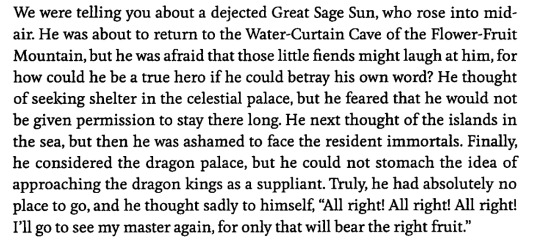
Have you ever had an ex who promised to change that thing you broke up with them over - only to go right back to their old ways once you agreed to get back together? Well, Wukong is the platonic version of that:

Tripitaka, to his credit, is not fooled:

Is this really the same guy who was fooled three times by Lady White Bone - and so many others? I think our boy is growing up.
This is one of my favourite themes in JTTW - this stuff about gullibility being a moral shortcoming. I mean, I don’t actually know whether Wukong is sincere here. But it doesn’t seem like it.
I’m still against the violence - the band-tightening spell. But I have more sympathy for Tripitaka this time, because he’s made it very clear he wants Wukong gone. BOUNDARIES, WUKONG. And Tripitaka seems much more calm and collected, so it doesn’t seem spiteful.
Wukong continuous with his “weasley, manipulative ex” schtick:

Tripitaka, to his credit, maintains his boundary:

You really can’t say fairer than that. He doesn’t get violent - he gives Wukong a square warning.
It's pretty much the same when Wukong circles back when Tripitaka is hungry, dehydrated and vulnerable. Tripitaka still isn’t having it, and decides he’d rather die than accept sustenance from him. This, of course, is where Wukong hits Tripitaka - which is just beyond the pale.
Crying
Wukong gets an audience with Guanyin to dob on Tripitaka, and here’s where it happens:


I know next to nothing about pre-modern Chinese culture, but apparently this is how it’s DONE.
For context, a few weeks ago, I tried to find out what the deal was with male crying. After all, Tripitaka cries a LOT. It turns out that academic Ya Zuo has done a bunch of work on it - at least for the Song era. It was fascinating - to me, anyway. (Scroll down to the row of tear drops if you’re not so fascinated, cos I’m gonna go on a spiel here.)
Crying was seen as an activity done by men, to be witnessed by other men, mostly for the sake of consolidating elite power alliances with… you guessed it… other men. Women and plebs could cry too, but their crying was seen as LAME, whereas elite male crying was BOSS.

This is kinda cool. Out of all the times somebody cried in Record of the Listener, it was men 42% of the time. That doesn’t sound like much, but women only made up 25% and children 4%. I guess the rest of the time it was deities, animals or - importantly - crying as a group activity. Group crying was well and truly a male-led, bromance-promoting activity. If Game of Thrones or House of Cards had been set in Song China, all the top players would have been strategically crying:
“[C]ontrary to the modern association of tears with weakness, male lacrymation [crying] in the Song acted to articulate and reinforce a position of dominance." (at 42)
Interestingly, Zuo finds that they weren’t necessarily crocodile tears - despite being political and purposeful.
Zuo explains a lot of interesting things. Apparently, one of the upsides of tears was that they could bridge awkward gaps where verbal communication would have just made things worse. As Zuo points out (I’m very loosely paraphrasing), you can’t really explain to the new emperor how you are TOTALLY loyal to them even though they just took over from your best bud the old emperor, who stood for the polar opposite. But you CAN bypass the awkwardness and cry your way into demonstrating some sort of unexplained yet heartfelt loyalty.
Wukong’s crying TOTALLY fits this. The “power alliance” thing, that is. Not the “this is too awkward to talk about” thing. He’s crying to try to convey his deep sincerity to Guanyin and forge an alliance, so he can force Tripitaka’s hand.
Tripitaka’s general teariness is a different beast. I’m still not sure that I understand the cultural context, but Zuo does talk about male tears in relation to morality. For instance:

That probably goes some way to explaining the waterworks when the queen of Women State and the scorpion demon tried to seduce him.

Guanyin: I’m always delighted when Guanyin makes an appearance. I could go on and on. Still, I don't really see why she thinks Wukong can't be in two places at once. Everyone knows he can do the hair-breath-clone thing. Unless someone's impersonating him.
Also, why would she send WUKONG with Sandy to go ascertain the truth at Flower-Fruit Mountain again? That’s like sending an accused criminal back to the scene of the crime with the police inspector to “help” them work out if the accused really did it.
Sandy: It was interesting to see Sandy take centre stage. I thought he was the even-keel voice of reason in the background. Apparently not, cos his idea of getting to the bottom of the truth about his doppelganger is simply to… kill him.
Dragon Horse: Why are they always tying up Dragon Horse? He’s an intelligent dragon-person in horse form. Surely he’s committed to the journey and knows not to wander off:

…

Tripitaka’s seeming death: Sandy and Bajie's reaction to thinking Tripitaka was dead was… oddly lax. They really should have tried a bit harder to check before calling it:


Calm down, guys. He's not dead.
Blue woollen wraps: What’s the deal with these? If they’re just blankets, can’t they get more? Did I miss some backstory? I’m gonna have to CTRL+F the chapters I missed, or something.
Tea rice: This made me want to try making tea rice. I’d never heard of it.


(Couldn’t find a pic of Chinese tea rice.)
Bad management: Why does Tripitaka bother to ask who wants to go to Flower-Fruit Mountain if he was always going to pick Sandy?

Wukong and the passport: He seems to think there’s a LOT more meaning to it than there is. Has the stress of the split turned him into some kind of passport conspiracy theorist? (Jokes.)

Wukong’s reply to Sandy about Golden Cicada makes no sense: Sandy points out that Wukong can’t just make his own journey to the west, because Tripitaka is Golden Cicada and that’s kind of the whole point. Wukong basically replies that he’s created his own clones of Tripitaka, Bajie and Sandy. But clearly the clone Tripitaka isn’t Golden Cicada, so it’s not really an answer.
Wukong’s group EATS their fallen comrade: what?!

Red Boy is still pretty snarky. I don’t think Wukong understands the concept of, “He’s just trying to get a rise out of you”:
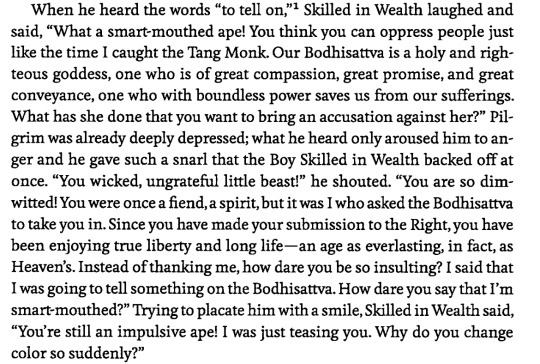
And that’s it from me this week! I’m off to find out what the deal is with this Flower-Fruit Mountain Wukong clone thing.

“This is not what I meant when I said, ‘Let’s do body doubling'.”
@journeythroughjourneytothewest
---
Image credits: The usual spiel. The images/gif above are random content from the web, some modified, some not. They are not original. The pre-existing images should turn up with reverse googling or have links embedded, but feel free to ask and I’ll dig up sources.
#journey to the west#jttw#jtjttw submission#jttw reading group#jttw book club#tang sanzang#tripitaka#sun wukong#guanyin#sha wujing
13 notes
·
View notes
Text
Chapter 56: Tripitaka gets mugged; Tripitaka and Wukong have a blue
In this chapter, rather refreshingly, nobody wants to eat or have sex with Tripitaka. No. In this chapter, Tripitaka has the equally disastrous but rather more mundane experience of getting mugged.
Yep. Not realising who he is, some run-of-the-mill local bandits try to mug him, just like they would any other guy on the road. How’s that for equality?
It also goes to show how important it is to be in the know. If only they’d realised who he was, they could have eaten or sexed him and gained immortality. Clearly word doesn’t travel as fast on the human grapevine as the demonic grapevine. You’ve got to pay more attention to who’s been reincarnated recently, lads.

Anyway. I’m loving Bajie and Wukong’s dynamic in this chapter. They’re just two guys joking around, having fun and annoying each other for shits and giggles. Bajie is trying to hurry up Dragon Horse - who doesn’t care, and keeps plodding along at the same speed. Wukong rebukes Bajie, but then decides Bajie has a good point about hurrying up, and sends Dragon Horse sprinting. Owned, Bajie.
These hijinks lead to Tripitaka being galloped way up the road, all on his lonesome, where he is surrounded by bandits who want to mug him:

Pardon me. Not mug him. They are… self-appointed… tollway men:

They take payment in the form of clothes, horses and gold. And they don’t give concession rates to monks. Failure to pay may result in detention up a tree until one of your mates can come up with the money.

Now, what did I say about Tripitaka being better when Wukong isn’t around? There are no tears here: Tripitaka handles it like a pro. Sort of. He explains that, as a monk, he’s not exactly their best bet if they’re looking for sweet cash money. When they demand his clothes and horse instead, he just calmly explains that his robes aren’t worth stealing. He also implicitly threatens them that they’ll get a bad incarnation if they’re mean to him:

I love this little backgrounder about how the robes are made. It seems like the patchwork thing is a true story. Apparently, traditionally:
“Jiasha are made by piecing together sections of cloth donated from members of the community in a patchwork-style design. Unlike patchwork, the arrangement of panels is very specific, influenced by the Buddhist mandala motif, with a core center and flowing symmetry. The modest cut of the jiasha and pieced-together appearance references the rags worn by the Buddha during his ascetic period.”
Anyway, the muggers slash tollway men still aren’t impressed, so Tripitaka starts lying and pretending that Wukong will turn up any minute with the cash they want. That’s fine, but the narrator has a mega brain fade:

What? “Never lied in his life before”? Uh, remember two chapters ago, when Tripitaka was swearing to love and cherish the queen of Woman State til death do they part? Yeah. That little thing.
In any event, this is where Tripitaka begins crying. Well, fair enough. He did really try. The bandits tie him up and leave him dangling from a tree, where Wukong finds him.
I have to say, I love Wukong’s personality in this chapter, dubious as it may be. He’s so jovial:


I love him trolling the bandits, channelling pretend spirituality:

… before sweetly telling them that perhaps they should actually give him THEIR money:

And playing with the bandits - telling them they can have his staff if they can pick it up:

Ah, the iconic needle/staff in the ear:

But I’m interrupting myself:

Wukong is having a blast. Needless to say, he kills a few bandits. The rest flee.
Tripitaka proceeds to absolutely lose his marbles about Wukong committing homicide. And don’t get me wrong: it’s homicide. But Tripitaka manages to do it in a way that makes him come off as a jerk - which is quite something, when you’re protesting homicide.
When he discovers what’s happened, Tripitaka loses all spiritual composure. He starts acting like a road rager stuck in peak hour traffic, muttering low-grade verbal abuse:

Wukong isn’t even in earshot at this point. When he does get within earshot, Tripitaka continues:

Spite? That doesn’t sound very spiritual!
He attempts to give the bandits a proper burial, which seems nice at first. He gets Bajie to bury them, and tries to find incense and candles for the ritual - or substitutes, at least. But once he starts praying, it becomes clear what his real motives are. All he wants to do is suck up to the deceased, point the finger at Wukong, and make sure no ghosts come seeking retribution against him. It’s totally self-centred and fear-driven - not coming from a genuine place of caring for the deceased at all:


There is more to his prayer, and… it isn’t great, either. It’s just him telling the bandits that he, Tripitaka, tried to play nice (so it’s their own fault they got killed); that their deaths are Wukong’s fault (not his); and that he’s been very nice to them by doing this funeral ritual (ie he didn’t perform this funeral for selfless reasons: he did it so they will give him credit).
He could at least have wished them a positive reincarnation. Or something, anything, that was purely for their sake and not for his. Alas! Our young Tripitaka still has a way to go, spiritually.
Bajie sees through Tripitaka’s pseudo-spirituality, and teases him:

Wukong is less amused. He seems to find the ass-kissing funeral schtick ridiculous and kind of cowardly. Wukong isn’t afraid of any ghosts coming after him and makes this clear - perhaps more to make a point to Tripitaka than anything else:

Next, they find shelter at an old couple’s hut. The old man is nearly hysterical at the sight of the disciples, and won’t calm down. His wife is far more grounded, and gets him back on track.
I love how blunt people are about Bajie’s looks, and how indomitably cheerful Bajie’s response is:

They all have dinner, during which they find out that the old couple’s son is one of the bandits. Wukong offers to kill the son (huh?!), but the old man prefers him to stay alive, so he’ll have someone to dig his grave one day. The disciples gently remind Wukong that it’s none of his business.
Let’s cut to the middle of the night, where the bandits gatecrash the old couple’s house and decide to kill Tripitaka & co in their sleep. The old man tips them off.
I want to pause here to observe how bizarrely calm and composed the old man is. This is a guy who became hysterically scared just looking at the disciples’ faces. Now he’s in a tense and unexpected emergency situation, trying to sneak one group of guests out of the house, lest his other guests murder them. Yet he acts like it’s nothing. Is this not the first time that his bandit son has tried to murder a houseguest? Tripitaka is shaken by the news, but the old man sneaks them out and falls back asleep without a second thought:


Of course, the bandits give chase, and Wukong kills many. He goes out of his way to identify and behead the son of the old man - then show off the head to Tripitaka.
Why Wukong would do this, I have no idea. Is this meant to indicate something about Confucianism? Or is it just Wukong’s usual love of homicide? I feel like I might be missing some cultural context.
Tripitaka falls off his horse in fright, yells at Wukong and, as soon as he’s able to stand again, breaks out the band-tightening spell on him. This, to me, is where Tripitaka crosses the line. It’s like he’s performing the Cruciatus Curse:

More than ten times? It's awful.
Now, just a heads up. I was VERY upset that Tripitaka did this, and I wrote a lot about it. But I realise we all have different perspectives. So if you don’t feel like reading a giant essay about why I felt this was so bad, here is a pretty picture of a traditional jiasha for you, and let’s pick up again next week.

Alright, brave reader. Here’s my reaction to Tripitaka’s torture spree.
I’m not saying that it’s inherently wrong to punish somebody for homicide with something along these lines. It would be a very different story if Trikitapa had taken time out, reflected on the whole thing, and soberly decided that it was necessary to do this as a punishment. But it just seems like he’s lost his temper and lashed out.
I think I’m more annoyed with Tripitaka than Wukong, because Wukong has never pretended to be anything other than a fighter and killer. Tripitaka acts like butter wouldn’t melt in his mouth and preaches compassion. Wukong didn’t want to become Buddhist and has only done it under duress. Tripitaka may not have chosen to become Buddhist originally, but he seems to have embraced it pretty enthusiastically. Wukong’s job is to keep Tripitaka alive on the road, so Tripitaka can get to the west - and Wukong is well and truly doing that job, even if Tripitaka doesn’t like the way that he’s doing it.
It’s easy to criticise others and backseat drive. Tripitaka is expecting Wukong to be both a consummate fighter and spiritually precise. Maybe, for Wukong to be the fearless fighter that he is, he needs a certain level of callousness. Wukong goes into situations that nobody else will - again and again. Who says it’s so easy for him to be proportionate when he’s fighting? It’s not always possible to be in two different gears at once. Tripitaka is all too ready to criticise and demand, without ever having walked a mile in Wukong’s shoes.
And Tripitaka seems to expect more of Wukong than Tripitaka expects of himself. Tripitaka hasn’t even tried to learn self-defence. He has not tried to become more well-rounded. Yet he tortures Wukong because, in his eyes, Wukong is not perfect enough or sufficiently well-rounded. I think Tripitaka should have to try to learn the 72 forms himself before he gets to even THINK about using torture on Wukong.
I never expected to find myself defending a killer - even a fictional magic monkey killer. Let me be very clear, I condemn homicide completely. I’m just saying, I think Tripitaka is a prick to use torture here. It was different when he used the band-tightening spell to try to prevent Wukong from killing somebody. That’s fair enough. But using it to lash out is inexcusable.
And it’s totally hypocritical. Tripitaka claims that he’s trying to teach Wukong compassion. It’s like he’s saying, “So help me God, I’ll beat you until you’re more compassionate.” How is that meant to work?
It disturbs me on the level of allegory, too. Like, if Wukong represents the mind-heart, what is this saying? That the mind-heart has to be dominated through force and brutality? Really?

After the band-tightening spell, Wukong begs Tripitaka to use his words, and Tripitaka obliges - saying he doesn’t want Tripitaka as his disciple.
Horrifyingly, Wukong kowtows to the guy who just went full Voldemort on him. I’m gonna say that kowtowing to someone who just tortured you seems like an excess of filial piety. But at least Wukong isn’t getting violent with Tripitaka like Tripitaka just got violent with him.
He begs for an explanation. This is pretty staggering. As wrong as it is for Tripitaka to use the band-tightening spell like this, it should be obvious to Wukong why he’s angry. Wukong clearly hasn’t listened to a word Tripitaka said, and he is a massive jerk for that.
Tripitaka explains (unsurprisingly) that it’s due to all the unnecessary killing, and tells him to get going before he uses the band-tightening spell again. Wukong vanishes.
Oof. Well, that was all very unpleasant. But I certainly want to see how this turns out next week.
@journeythroughjourneytothewest
---
Image credits: The usual spiel. The images above are either AI, or random pictures from the web that I’ve modified, or a Frankenstein of both. They are not original. The AI image generation is by Stable Diffusion. The pre-existing images should turn up with reverse googling, but feel free to ask and I’ll dig up sources.
#journey to the west#jttw#jtjttw submission#jttw reading group#jttw book club#tang sanzang#tripitaka#sun wukong
15 notes
·
View notes
Text
JTTW chapter 55: Tripitaka and the sexy scorpion spirit
The title really says it all:


So let’s recap. Tripitaka has been abducted by a demon who wants to have sex with him. He’s on his own this time - unlike last week, when all his mates were around to help him deal with the queen, who also wanted to have sex with him.
So Tripitaka is in the demon's cave, and the disciples are hanging around outside.
Sandy seems a bit over the whole rescue dynamic. He figures that Tripitaka can take care of himself, and that sex kidnapping is not that much of an emergency:

On the other hand, Wukong isn’t confident Tripitaka will pull through, and Bajie thinks it’s hopeless. The whole mission hinges on whether Tripitaka cracks and sleeps with her. Cos if he does, they're packing up and going home:

Well, Sandy was right. Tripitaka ACES it. The scorpion spirit is coming on strong, but Tripitaka just isn’t interested:

Note his forthright, stubborn attitude and conspicuous lack of crying. Contrast last week where he was turning red, looking away, physically shaking and crying:

WHAT IS THIS CHANGE OF PERSONALITY?
Either it's character growth (which has somehow occurred in the time it took for the scorpion spirit to teleport Tripitaka to her lair) or my theory (possibly based on a bit of wishful thinking) is that it’s influenced by whether Wukong is around or not.
Now don’t get me wrong. I love Tripitaka with Wukong. I love their potentially codependent relationship and the male-damsel-in-distress dynamic. Tripitaka is the most hopeless one of the group AND their undisputed leader. It’s amazing. I’ve never seen a male character lead a male group by crying and constantly requiring rescuing. I’m here for it.
But. Interestingly. When Wukong isn’t around, I feel like Tripitaka goes, “stuff it, I might as well save it,” and he calms down and just deals with stuff matter-of-factly.
I will admit he still cries ONCE:

Okay, twice:

Okay. So maybe I'm wrong. But on the whole, there is a lot less “clutching my handkerchief crying” sort of energy.
Anyway. When Tripitaka knocks back the scorpion spirit, the disciples decide he’s worth rescuing:

So basically, they deliberately abandoned him and left him alone with a demon overnight to shit test him.
They try to bust him out, but they don’t fare too well against the scorpion spirit’s sting. What are they to do? Don’t even worry: Guan Yin has got their back.
I love Guan Yin. You know where you stand with Guan Yin. There’s no praying and sitting around anxiously, wondering if she’ll come through. She’s already on it. Having trouble with a scorpion spirit you can’t conquer? Don’t worry:

And that guy is Orion.
Who turns out to be… a giant… rooster?


My reaction was, “Huh?!”
First I kind of assumed Wu Cheng’en was just having fun making up magic powers for random animals. But no!

From my very scientific googling, it seems like maybe chicken > scorpion is actually a thing. TIL.
As a tangent, roosters got me thinking about alarm clocks, and how people used to wake up before alarm clocks were a thing. That took me down a rabbit hole, and now I’m discovering that candle clocks were a thing in ancient (ancient-ish?) China. Because apparently roosters are unreliable rogues and may crow at sunrise, but may also crow at 3am just cos they feel like it.
Behold:

So that’s that. But let’s circle back to something. I couldn’t help but notice that, in this chapter, Tripitaka calls the scorpion spirit a “powdered cadaver”:

Why so harsh? It isn’t cos of her looks. The narrator is pretty clear that she’s attractive. And it seemed uncannily like last week, where Bajie called the Queen of Women State a “powdered skeleton”:

It seemed a bit rich coming from him, when he clearly found her attractive:

I was starting to wonder if it was some kind of ancient Chinese insult for beautiful women when I found this journal article. It seems like, basically, the skeleton reference came from (separate but overlapping) Taoist and Buddhist practices of remembering that hotness is merely a superficial, meaningless property of the transient material world. Or something like that.
So, good on you Bajie and Tripitaka for sticking to your Buddhism. But… maybe just don’t say it OUT LOUD to people’s faces next time. Sure, stick to your asexuality, but no need to get personal about it!
I wonder if the queen and the scorpion spirit got the reference or if they were just like, “What the heck? I’m not that skeletal or powdery! YOU’RE skeletal and powdery!” We’ll never know.

And now, in no particular order, I wanna give a shoutout to some of my favourite miscellaneous moments from the chapter.
I love how the characters put so much emphasis on good manners, even when rushing around magically bashing people up. Wukung rocks up at Star God Orion’s place unannounced and asks him to drop everything and help him with something that is really not Orion’s problem - yet Orion refrains from telling him to get stuffed. Instead, he just worries that Wukong will think he’s rude if he doesn’t invite him in for tea:

Also, the wild swings between dramatic whining and understated stoicism. Bajie gets stung painfully on the snout, but doesn’t want to make a big deal of it to Orion:

Indeed. I, too, like to communicate my severe injuries only in a roundabout way, in the course of apologising for not being able to uphold proper etiquette.
Loved this sweet poem about Wukong as a majestic bee:

And learned that you’re not a babe unless you have spring onion fingers:

Some things went over my head, though. What do you mean, puns about meat buns and water pudding? I assure you, Tripitaka is not the only one who didn’t get it:
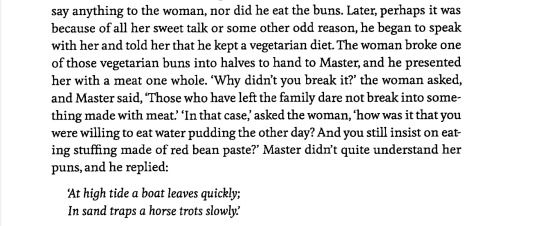
Even after reading Yu’s footnote about it:

As for my least favourite moments, Bajie is still being a chauvinistic so-and-so, calling women sexist words with disturbing enthusiasm. And Orion loses points for agreeing with Bajie wholeheartedly, instead of, you know, talking to him about his choice of language. But enough of that. Tripitaka has transcended the temptations of powdery skeletons, and it’s on with the journey.
@journeythroughjourneytothewest
—
Credits: The images above are either AI, or random pictures from the web that I’ve captioned for this, or a Frankenstein of both. They are not original. The AI is a mix of VEED.IO and Stable Diffusion. As for the images, they should turn up with reverse googling, but ask if you’re curious and I’ll dig up sources. Disability means I can’t draw at the moment, but honestly this turned out to be pretty fun anyway. Thank you dear internet for this bounty of meme-able images.
#jtjttw submission#jttw reading group#jttw book club#jttw#journey to the west#tang sanzang#tripitaka#guanyin
21 notes
·
View notes
Text
Pilgrims, I felt the need to inform you that I found the perfect summary of Tang Sanzang's adventure in the Kingdom of Women

45 notes
·
View notes
Text
JTTW chapter 54: Much Ado About Getting Your Passport Stamped (Sexual Harassment Survival Edition)
@journeythroughjourneytothewest
Alright. Let’s start with a chapter 54-themed personality quiz. (Is this allowed in book club? I don’t know.)
1. There’s someone drop-dead gorgeous around. How do you react?
(A) I turn red, cry and wish the whole thing wasn’t happening.
(B) I have a treasure staff and I’m not afraid to conk people on the head if they sleaze on my friends.
(C) Strategise. We can use this to get that passport stamp that we need.
(D) I don’t know, I didn’t notice. I was too busy teasing Bajie about his recent pregnancy.
(E) I drool and try to get them to marry me, obviously.
(F) I eat hay and chill out. I’ve already had one disastrous wedding.
2. Your friend has just broken up with somebody. How do you show up for them?
(A) I don’t know. I’m the hot one. My friends usually have to show up for me, not the other way around.
(B) Show up for them? What do you mean show up for them? I was the one who told him to love ‘em and leave ‘em in the first place.
(C) I yell at their ex, call them a powdered skeleton, and scare them off with my looks.
(D) I make sure they have space to heal by bashing any new suitors over the head with a treasure staff.
(E) I’m right here, all saddled up and ready to gallop my friend outta here before his ex knows what’s hit her.
Aaaalright. Let me back up a bit. I am so excited to discover that there’s a book club for JTTW. Especially for Yu’s translation. This is all of my JTTW fandom dreams come true.
Full disclosure, I watched the 1986 TV adaption to catch up on volumes 1 and 2. I wanna circle back and read them too. But in the meantime, HERE WE ARE.
Now, before we get into chapter 54, may we have a moment of silence to mourn the fact that I missed getting to do chapter 53 with y’all. I kind of wanted Tripitaka to have that baby. Just saying.
Anyway, let’s get to it.
I have to love this chapter, if only because it is firmly established as canon that Tripitaka is a BABE. No need to be subtle - the whole of the public is standing on the street, screaming that human seeds are coming:

His hotness is so overwhelming that people are sitting around, biting their fingers and shaking. It’s a lot:

Hot or not? The question soon becomes a matter of royal interest:

Happily for all, Tripitaka is a certified hottie:

His disciples, however, are not. They are so un-hot, in fact, that the queen wants them out of the queendom:

Maybe that’s why there are no men in the queendom: nobody but Tripitaka has ever been cute enough to make the cut. That or the queen just didn’t want potential spirits in her queendom. I’m not sure.
Anyway, back to Tripitaka’s looks. The Grand Preceptor is into him:

The narrator is into him:

The queen is into him:
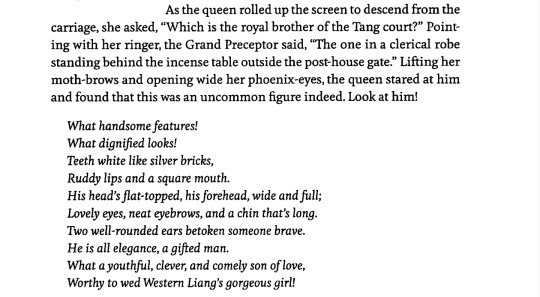
And I mean REALLY into him:

“Ride the phoenix”, hey. Oh dear. But wait, there’s more:

And yet more:

So. We get the message. Tripitaka is the celibate babe of your dreams.
Tripitaka bears this all like the very epitome of blushing, virginal chastity. He’s startled:

He’s wordless:

He’s blushing and averting his gaze:

He’s physically shaking:

He’s straight up crying:

Then he pulls himself together and rallies strangely well:

What a turnaround. He’s gone from crying, blushing and speechless to calmly advocating for Bajie’s stomach. The queen’s “fragrant shoulders”, “peachlike cheeks” and “scented mouth” don’t phase him now.
I mean, hell, he’s even making small talk about vegetarianism. Those snuggles and smiles don’t throw him:

He gives a wedding toast. He calmly brushes off the queen’s attempts to hasten his coronation. He makes smalltalk about his religious name, his disciples’ origins, their mission from Guan Yin, everything. Who even needs Wukong? Suddenly, Tripitaka has GOT this.
When the time comes to complete the ruse, he smoothly talks the queen into letting him “send off” his disciples, before breaking it to her:

Well, what can you do. A lot of marriages do get annulled these days.
All hormones aside, let’s remember what this was about, at least for the guys: getting their passport stamped.

That’s their whole reason for playing along with this:

That and the fact that they didn’t want to bash up human women if it could be avoided.
And here it is - the magic moment of passport certification:

I feel like that could have been a bit more dramatic, considering. Still, when I read this, I couldn’t help but think, “Is this going to come back to bite them somehow - the fact that these three are now individually listed on the passport?” But I must remember that this is not some highly technical legal drama, and that nobody but me would be excited by a tale of bureaucratic paper wars over the passport particulars.
Anyway. You would think that Wukong could have just snuck in, stamped the passport and got them out of there. I think he honestly just found it funny how worked up Tripitaka gets about women, and preferred to stick around for the feast and the laughs.
Now, you may be thinking, “But hey, I’m still not quite sure after all of that - is Tripitaka really that attractive? And does it really, really matter?” FEAR NOT. This ain't over yet. Tripitaka has now been kidnapped by a woman who definitely wants to boink him, and his friends aren’t there to protect him. What will ensue? Will there be further sulking and blushing? We can only hope for a further, detailed investigation of the narrative significance of his hotness.
#jtjttw submission#jttw#journey to the west#jttw reading group#jttw book club#tang sanzang#tripitaka
23 notes
·
View notes
